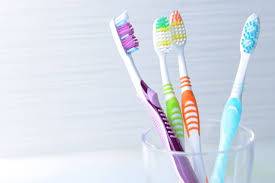_The Hidden Dangers of Leaving Your Toothbrush in the Bathroom_
Your toothbrush is an essential tool for maintaining good oral hygiene, but did you know that leaving it in the bathroom can pose serious health risks? Most of us store our toothbrushes in the bathroom, thinking it's the most convenient and logical place. However, this habit can have unintended consequences. In this article, we'll explore three compelling reasons why you should reconsider leaving your toothbrush in the bathroom.
_Reason 1: Bacterial Contamination_
Bathrooms are breeding grounds for bacteria, viruses, and other microorganisms. When you leave your toothbrush in the bathroom, it's exposed to airborne pathogens, toilet plume, and moisture. Toilet plume, in particular, is a significant concern. When you flush the toilet, it releases a fine mist of bacteria-laden water vapor that can settle on surfaces, including your toothbrush. This can lead to the growth of harmful bacteria like E. coli, Staphylococcus, and Candida on your toothbrush. These bacteria can then be transferred to your mouth, potentially causing infections and oral health issues.
_Reason 2: Humidity and Mold Growth_
Bathrooms are notoriously humid environments, creating an ideal setting for mold and mildew growth. When your toothbrush is exposed to high humidity, it becomes a fertile ground for fungal growth. Mold and mildew can accumulate on the bristles, handle, and even within the toothbrush's tiny crevices. This can lead to unpleasant odors, allergic reactions, and respiratory issues. Moreover, some molds produce mycotoxins, which can be toxic to humans. By storing your toothbrush in a dry, well-ventilated area, you can significantly reduce the risk of mold growth.
_Reason 3: Chemical Contamination_
Bathrooms often contain chemicals like cleaning products, air fresheners, and personal care items. These chemicals can release volatile organic compounds (VOCs) that settle on surfaces, including your toothbrush. VOCs can cause a range of health problems, from respiratory issues to neurological damage. Furthermore, some chemicals can react with the materials used in your toothbrush, leading to the leaching of toxic substances like BPA or phthalates. By storing your toothbrush away from these chemicals, you can minimize your exposure to these potential toxins.
_Solutions and Precautions_:
- Store your toothbrush in a dry, well-ventilated area, like a bedroom or closet.
- Use a toothbrush holder with good airflow.
- Rinse your toothbrush thoroughly after each use.
- Replace your toothbrush every 3-4 months or sooner if visible signs of wear appear.
- Consider using a UV toothbrush sanitizer.
By taking these simple precautions, you can protect your oral health and overall well-being. Remember, your toothbrush is a personal care item that deserves careful handling and storage.
Sources:
- American Dental Association
- Centers for Disease Control and Prevention
- National Institute of Environmental Health Sciences


